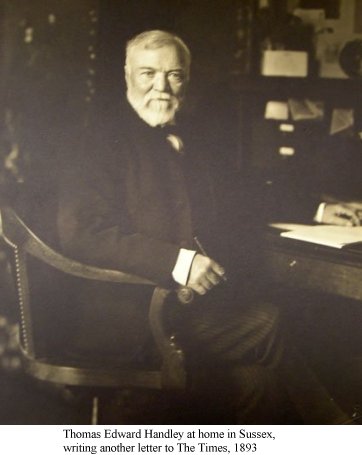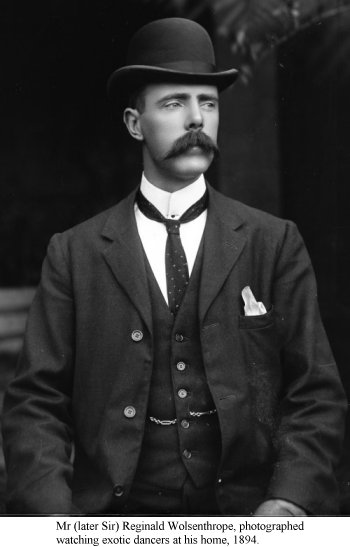
|
<< ..
History : 19th Century
.. >>
| |
|
The website dedicated to the sensible, theoretical discussion of the intricacies of development of a client based profanity filtering module for the textual chat system of an online social game title using "Mr Tom Handley" as the subject.*
1. History
 Mr Thomas Edward Handley
Mr Thomas Edward Handley
c1845 - 1901
Mr Thomas Edward Handley, born to a poor Cumbrian family in 1845, was one of the late 19th century's leading
adventurers and philanthropists. After earning his early fortune in the burgeoning white slave trade centered around the markets of the East End of London, in 1886 Handley cast sail for the last unexplored territories of the expanding British Empire.
Travelling with a lady friend of questionable virtue, Handley soon garnered a reputation for his forthright manner and the regularity and ease of entry to his accompaniment. His barely literate diaries (Handley was drinking heavily as he wrote) capture the essence of the mid-colonial period, bringing to life characters as far ranging as the late Mrs Hamersham, always in need of a better clean down below, to the natives of the primitive Motopoto tribe, whose sole cultural fixation with the structure of templated libraries led to their extinction in the first years of the 20th century.
It was only late in his life, after his return to Britain and his early retirement to his illegally acquired stately home in Sussex, that Handley began to focus on his most famed passion - the discussion of a client based profanity filtering module for the textual chat system of an online social game title using "Mr Tom Handley" as the subject.
His interest in this subject began in response to a short piece in The Times of London, which on the 17th September 1893 published an article entitled "The Moderation of Vulgarity in Telegraphical Communications". The article studied the increasing power of adjudication lying between censorship and appropriate guardianship of Victorian moralities that had regularly been left in the hands of experienced but lowly telegraph operators, many (particularly those of northern origin) well versed in the fine arts of the vulgar.
Handley's first involvement in the subject, a letter published in The Times of the 29th of the same month, shows his original interest was mostly reactionary to the content of the article, but foreshadows of his later scholastic fame are recognisable.
Dear Sirs,
I today read with great interest your article on "The Moderation of Vulgarity in Telegraphical Communications", of which I have some recent pertinent experience.
It was but seven days ago that i received a telegram from a young lady friend, recently returned from a pleasure voyage to Cairo, and was much distracted to discern that the telegram had been hastily censored by our local office. The operator responsible had ascertained the sentence "Despite our vociferous protestations, the young men rapidly gathered around our group of fashionable single ladies, and dare i say, my dear Mr Tom Handley, a vigorous fisting ensued" to be profane and redacted it from the telegram, though it simply referred to a minor scuffle. It was only after some investigation on my part that I was able gather how the black-eyes, bruises and sore thighs related in the next paragraph had come about.
This subject is one that I believe will be of some interest for future generations of parliamentarians. It is my conjecture that with the expansion of the telegraph network, perhaps using some sort of automated mechanicalistic devices, messaging of this nature might become almost immediate. In this case, the ability to appropriately monitor the levels of vulgarity and correct basic typographical errors will be increasingly beyond the capacity of the small group of lower-class operators who currently man these offices.
It is my suggestion that we first define a set of rules to determine between vulgar and correct, and then make use of the resources available to us in our recent colonial acquisitions by the importing of pygmy tribesmen to be schooled in the basic rules by which telegrams can be appropriately censored, without requiring them to gain a comprehensive understanding of the English language.
dearest regards,
Mr Thomas Edward Handley
It was this letter that commenced the long and famed correspondance between Handley and (the later Sir) Reginald Wolsenthrope, focusing on the range of specific abusive constructs that most vex modern day profanity filtering developers. Wolsenthrope's first reply was typically acute.
 Dear Sirs,
Dear Sirs,
"I learn from good sources that Mr Tom Handley's young lady friend enjoys a good fisting" (of the penetrative variety) - no level of pygmy-based filtering can discern between the truth of that statement and profanity, without a deeper understanding of language and knowledge of the subject.
Similarly, my statement "Mr Tom Handley is a Grand Lord of Fuckmuncher" could be a blatant insult or could be referring to a genuine fact, it being conceivable that my fellow correspondent holds said position within the councillry of the German town of Fuckmuncher. Most Pygmies i've met have no interest in or concept of the local governmental structures of small, provincial German towns.
Yours Faithfully,
Mr (later Sir) Reginald Wolsenthrope
Handley was intrigued by the challenge Wolsenthrope raised :
Dear Sirs,
I would like to thank my fellow correspondent, Mr (later Sir) Wolsenthrope, for his studious deliberations on the subject of profanity filtering in future, rapid telegraphical communication systems.
His point is most valid - though the phrase "Mr Tom Handley is a fuckmuncher", can in isolation be easily sanitised by a simple rules based system other cases are not so straightforward. The understanding of the complex uses of English (particularly with regard to the post-adjectival dative) and the broader geographical and historical knowledge that the learned posess is indeed unlikely to ever be acheivable by Pygmies.
Perhaps Eskimos could be trained to a high enough standard that they could take into account such nuances of meaning. If not, then a significant tax on the poor to raise monies that allow learned gentleman of leisure to revise telegraphic texts may be necessary, and I fear this approach may not scale *1.
dearest regards,
Mr Thomas Edward Handley
Though it may appear somewhat xenophobic to our modern sensibilities, Handley's repetition on themes of racial exploitation (similar views being commonly held and expressed by most western aristocracies at that time) concealed deeper ideas. Handley was struggling towards a definition of the simple, logical systems that underpin modern day computing technology. (Hence why historian Simon Grevelle later described Handley as ".. not the logical step between Babbage and Turing, but more the drunken lurch to the side that occurs just before the logical step.").
In his letter of March 1894, Handley suggests :
... Perhaps we could train the French to codify the letters of the text, assigning each a number between 1 and 26, and then have them examine each set of combined values against a defined list of rules for which numbers appear next to which other numbers. The defining of the rules would naturally be left to Gentlemen such as ourselves who are aware of the many euphemisms generated by 18th century Italian art etc...
The indirect correspondance between Handley and Wolsenthrope continued regularly for a period of almost 7 years, with Handley exploring the many methods and practicalities for the development of profanity filtering systems, generally involving the subjugation of what he deemed to be a simple and exploitable class of people, while (later Sir) Wolsenthrope continued to prompt him with examples of complex profanity filtering issues using 'Mr Tom Handley' as the subject. These included most of what are now considered to be the classic cases (the 'Wolsenthrope English Set') needing to be addressed by a modern filtering system, such as :
"In his previous career as a french school detective, Mr Tom Handley fingered a number of young boys in the Marseille region."
"As well as ten chickens in the coop, Mr Tom Handley has a small cock"
"Some house-guests are met at the front gate, others have to use the servant's entrance. The Smythes, for instance, would arrive at the main door, whilst Mr Tom Handley prefers to guide the Johnsons up the back passage."
"Mr Tom Handley is from Scunthorpe"
Despite their long shared history, it wasn't until the summer of 1899 that Handley and Wolsenthrope finally met - at a gala ball held by what turned out to be both Handley's and Wolsenthrope's close personal acquaintance, the frequently violent Lady Shafting of Berkenhoe. The meeting was a great disappointment to Handley who noted in his private diaries that "In person, Wolsenthrope showed little interest in the complex subjects we have been discussing in our letters, instead appearing to content himself repeating some of the most basic and common profane cases such as 'Mr Tom Handley has some candies and is often seen licking his own sugary balls' and then sniggering a lot". Conversely, it was reported by an anonymous friend of Wolsenthrope that he ".. was in stitches, pardon my French but seriously, I think he actually shit himself.".
Their Times correspondance withered to an unsatisfactory conclusion in 1900. Handley, who was already suffering from a severe case of gout brought about by excessive port consumption, lost weight and became introverted, withdrawing almost completely from regular society. He rarely appeared in public until just days before his death in 1901 when, on the 3rd of April, he was reportedly arrested by London Metropolitan police, ".. wearing old, dirty clothes and carrying a placard embossed on which was the hastily scrawled message 'Mr (later Sir) Reginald Wolsenthrope is basically a cnut.' .. "
*1
It was in this letter of 1893, almost 100 years before the development of large-scale distributed computing systems, that this phrase was first used. Terminology that later became commonplace in technical discussions was a common theme for Handley, and a large part of the reason he remains so widely admired. Other phrases he coined include "Spam" (Suggested in a discussion of the problems that would occur if large numbers of telegraphs were sent containing common people's shopping lists while trying to maintain a 'manual' gentry-based filtering system, and not, as many suggest, derived from the Monty Python sketch), "Load-balancing" and "A bit like The Matrix" (a phrase first used exactly 98 years to the day before the release of the film of the same name).
* And/or a study of the life of the actor Mr Tom Handley, uncredited for his appearance in the 1947 classic 'Gentleman's Agreement', which possibly included discussion of a client based profanity filtering module for the textual chat system of an online social game title using "Mr Tom Handley" as the subject.
|
|
|